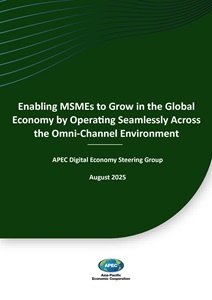
Proceedings
APEC Workshop on Promoting Decarbonization of Power Sector by Using Carbon-Free Energy (CFE)
The Asia-Pacific Economic Cooperation (APEC) is a regional economic forum established in 1989 to leverage the growing interdependence of the Asia-Pacific.
The Asia-Pacific Economic Cooperation (APEC) is a regional economic forum established in 1989 to leverage the growing interdependence of the Asia-Pacific.
APEC ensures that goods, services, investment and people move easily across borders. Members facilitate this trade through faster customs procedures at borders; more favorable business climates behind the border; and aligning regulations and standards across the region.
APEC ensures that goods, services, investment and people move easily across borders. Members facilitate this trade through faster customs procedures at borders; more favorable business climates behind the border; and aligning regulations and standards across the region.
APEC works to help all residents of the Asia-Pacific participate in the growing economy.
APEC works to help all residents of the Asia-Pacific participate in the growing economy.
Capacity building projects play an important role in helping translate APEC's goals into reality.
Capacity building projects play an important role in helping translate APEC's goals into reality.

Reports
•August 2025
Download Report
975KB
Published Under
Committee on Trade and Investment (CTI), Digital Economy Steering Group (DESG)
Accessed
376
Pages
16
Micro, Small, and Medium Enterprises (MSMEs) are a driving force of the Asia-Pacific Economic Cooperation (APEC) region, generating 7 out of 10 jobs and contributing up to 40% of gross domestic product in emerging markets. However, as the global economy evolves into a more interconnected and digital landscape, the survival and growth of MSMEs hinge on their ability to embrace hybrid business models that blend physical operations with digital innovation. This Asia-Pacific Economic Cooperation (APEC) project aimed to strengthen policymakers’ ability to 1) facilitate “integrative” policies that enable MSMEs to participate in physical and digital channels; 2) develop “balanced” policies that do not inadvertently favor one channel over another; and 3) collect purpose-driven data (quantitative information that reflects a company’s business operations, e.g., customer engagement) from originating platforms (physical or digital) to inform policy decisions.

